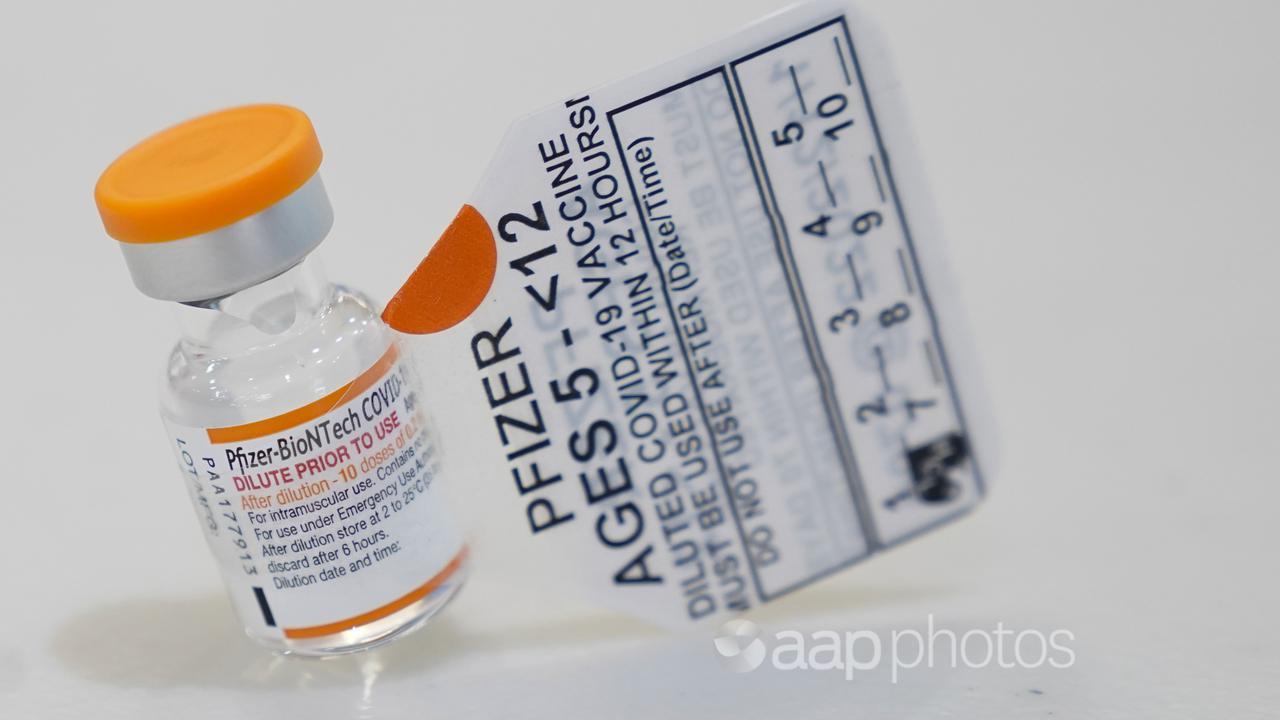The Food and Drug Administration opened the door for US children aged five to 11 to receive Pfizer’s COVID-19 vaccine after authorising it for emergency use on October 29.
An Australian anti-vaccination group used the announcement to claim an ingredient – tromethamine – had been added to the Pfizer vaccine to lower the risk of heart attacks and strokes in five-year-olds.
However, the claim is false. A compound has been added but its purpose is to stabilise the Pfizer vaccine during storage at higher temperatures, increasing its availability. The change is unrelated to potential vaccine side effects in children or other recipients.
The FDA noted the use of tromethamine (also known as “Tris”) in its authorisation statement for the administration of the Pfizer vaccine to children aged under 12. It said the formulation “contains Tris buffer, a commonly used buffer in a variety of other FDA-approved vaccines and other biologics, including products for use in children”.
“This new formulation is more stable at refrigerated temperatures for longer periods of time, permitting greater flexibility for vaccination providers,” it said.
The Australian Vaccination-risks Network, an anti-vaccination lobby group, highlighted the FDA’s statement in a Facebook video in which host Meryl Dorey claims the reason tromethamine has been added to the vaccine is “because the vaccine is known to cause heart attacks and strokes. And therefore, putting this in there may reduce the risk of heart attacks and strokes in five-year-olds” (video mark 11min 12sec).
The same claim was made by online “news curator” Press California on October 28.
It is true tromethamine is used in cardiac bypass surgical procedures, but experts told AAP FactCheck the compound was not used to reduce the risk of heart attacks in the Pfizer vaccine or elsewhere.
Isuru Ranasinghe, a senior cardiologist at Prince Charles Hospital in Brisbane, said there’s no evidence the addition of tromethamine lowers heart attack risk in anyone, let alone children.
“We certainly do not use it for that purpose when treating heart attack patients and I have never known anyone that uses it for this purpose,” Dr Ranasinghe told AAP FactCheck via email.
“Tromethamine (or tris) is a simple and common buffering solution that has a pH range similar to plasma and that extends the longevity of the vaccine in the refrigerator without requiring specialised freezers (i.e. extends the shelf life).
“This makes the vaccine more accessible and important particularly for regional remote communities and third-world countries where specialised ultra-cold freezers may not be readily available for storage and distribution.”
Colin Pouton, a professor at the Faculty of Pharmacy and Pharmaceutical Sciences at Monash University in Melbourne, told AAP FactCheck in an email that tromethamine allowed Pfizer to produce a product stable at -20C and possibly even in a refrigerator at 4C.
He also pointed out the current Pfizer product contains phosphate buffer, while the Moderna COVID-19 vaccine already uses tromethamine buffer.
Moderna lists tromethamine among ingredients which “work together to help keep the vaccine molecules stable while the vaccine is manufactured, frozen, shipped, and stored until it is ready to be given to a vaccine recipient”. The ingredient is also listed in the vaccine’s formulation for Australia.
At the time of writing, the use of COVID-19 vaccines for children under the age of 12 was being discussed at national cabinet in Australia.
While the addition of tromethamine to the Pfizer formula is unrelated to side effects, serious cardiac issues are acknowledged as a rare side effect of mRNA vaccines.
Australia’s Therapeutic Goods Administration (TGA) said myocarditis, an inflammation of the heart muscle, was reported in about 1 out of every 100,000 people who received the Pfizer vaccine. It was more common in young men and teenage boys after the second dose, occurring at a rate of around 3-7 cases per 100,000 people. Most cases were resolved within a few days after treatment and rest, the TGA said.
AAP FactCheck sought comment from Pfizer Australia about the claim but received no response.
However, in a statement to Lead Stories on a similar claim regarding tromethamine, Pfizer said there were no changes to the raw materials, mRNA, lipids or manufacturing processes used in its paediatric formula when compared to the vaccine given to adults and adolescents.
“To enable extended storage time an alternative buffer is being leveraged, known as a ‘tris buffer’. Simply put, this allows the mRNA to resist being degraded for a longer period of time before administration – meaning the pediatric vaccine can be stored for 2-8°C in commonly available refrigerators for up to 10 weeks,” the company said.
Pfizer added that the buffer would also be used in updated versions of its vaccines for adults and adolescents.
The Verdict
Tromethamine or “tris buffer” has not been added to the Pfizer COVID vaccine to reduce the risk of heart attacks or stroke in children.
Experts say tromethamine is not used to reduce the risk of heart attacks. Pfizer says the buffer was added so the vaccine can be stored in commonly available refrigerators – a statement backed up by the FDA and experts.
False – The claim is inaccurate.
AAP FactCheck is an accredited member of the International Fact-Checking Network. To keep up with our latest fact checks, follow us on Facebook, Twitter and Instagram.
All information, text and images included on the AAP Websites is for personal use only and may not be re-written, copied, re-sold or re-distributed, framed, linked, shared onto social media or otherwise used whether for compensation of any kind or not, unless you have the prior written permission of AAP. For more information, please refer to our standard terms and conditions.


















